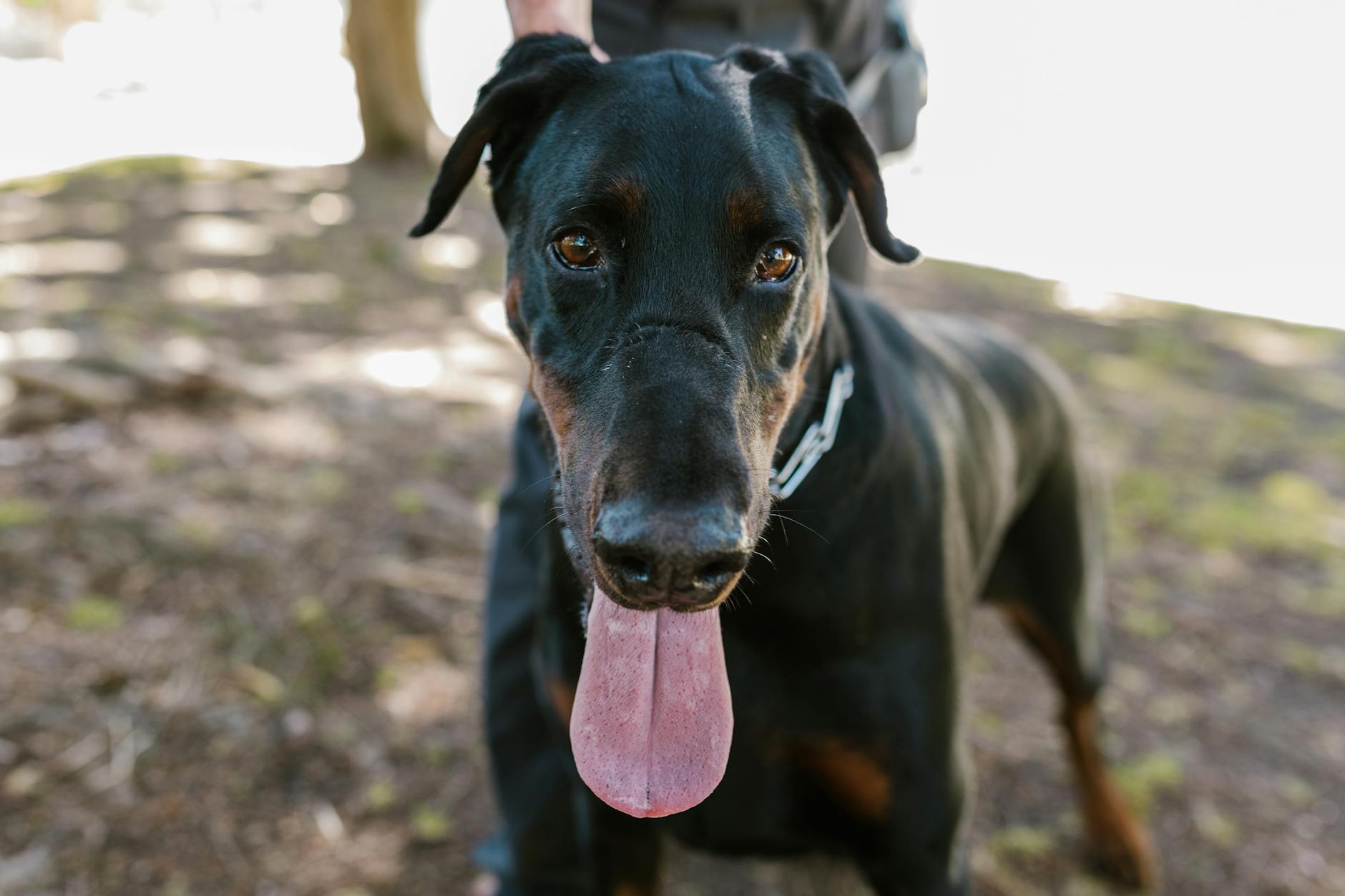What East Cornwall Dog Owners Need to Know About Loyalty, Safety, and Daily Walks
Hello, East Cornwall dog lovers! If you’re curious about the real Doberman temperament, you’re in good company.
Dobermans often look imposing, but most are best described as loyal, loving, and eager to please.
While some folks worry about aggression, Dobermans aren’t naturally mean or unsafe. With proper training and socialization, they’re gentle, stick by your side, and make excellent family dogs.
Understanding your dog’s personality is important for everyone’s peace—especially if you use dog walking services or book a professional dog walker for daily dog walks and group dog walks.
When local dog walking teams know what motivates your Doberman, they can tailor dog exercise services and puppy walking services for the best results.
The right approach helps even high-energy breeds thrive during walks and keeps everyone safe and happy.
If you need advice or are searching for reliable “pet walking near me,” learning about things like Doberman temperament can make all the difference.
Getting to know the unique nature of each dog means your walks through East Cornwall can be safer and much more enjoyable, both for your family and your reliable dog walker.
For more technical details about the breed, you can read the Dobermann Wikipedia page, and if you ever have a concern about safety while out and about, there’s helpful guidance on dealing with loose aggressive dogs on walks.
Doberman Temperament: History and Breed Origins
Understanding Doberman temperament starts with looking back at how this striking breed came to be.
Dobermans have a fascinating past rooted in hard work, loyalty, and a desire for the perfect companion and protector.
Let’s dig into where Dobermans came from, who created them, and what shaped their world-famous character.
If you are considering dog walking services or want to know how this breed fits into family and social walks in East Cornwall, learning about their roots will give you a real edge.
The Birth of the Doberman
The Doberman story began in the late 19th century in Germany. Karl Friedrich Louis Dobermann, a tax collector, needed a brave, reliable dog to keep him safe on his routes.
He set out to create a new breed with just the right blend of smarts, alertness, and physical power.
- The mix that mattered: Although exact records weren’t kept, Dobermans likely came from a blend of several breeds. Most experts suggest a mix of German Shepherds, Rottweilers, German Pinschers, Weimaraners, Manchester Terriers, and maybe even a bit of Greyhound.
- The goal: Dobermann wanted a dog that could switch from loyal lapdog at home to confident guardian on the street. The temperament and style of the breed reflect this “best of both worlds” mindset.
- First impressions: Early Dobermans were on the rugged side, prized more for courage and toughness than looks. Their jobs included guarding, herding, and even police and military work.
This foundation explains why Dobermans today still show remarkable bravery, loyalty, and adaptability.
Their roots as guardians also make them quick to bond with their people, and it’s one reason they enjoy the safety and routine of daily dog walks with a reliable dog walker.
For a more detailed backstory, you can visit the Doberman Pinscher History: Where the Breed Originated page.
Key Breeds and Their Influence
The Doberman didn’t just happen by accident—intentional choices went into every ancestor used in the mix:
- German Shepherd: Added intelligence and steadiness.
- Rottweiler: Built-in strength and protective instincts.
- Weimaraner & Greyhound: Contributed speed and sleekness.
- Manchester Terrier & German Pinscher: Brought agility and a “quick-on-their-feet” attitude.
These traits still shine through in the Doberman’s temperament.
That quick mind and alertness make them ideal for services like group dog walks and puppy walking services, where noticing what’s happening in the environment is key.
How History Shaped Modern Dobermans
Dobermans have come a long way since their early days.
Over time, breeders aimed for a friendlier, family-focused dog while keeping their natural guarding instincts. Today’s Dobermans are:
- Loyal to a fault: They stick to their family like glue.
- Smart and trainable: Great candidates for dog exercise services and obedient enough for safe outings with a professional dog walker.
- Alert, but not aggressive: With proper training and early socializing, they’re loving family pets, not unpredictable guard dogs.
In fact, Dobermans adapt well to regular daily dog walks, structured routines, and positive group activities.
This makes them suitable for those searching for “pet walking near me” and who need a breed comfortable in a range of settings.

Historical Appearance: Form Meets Function
Early Dobermans looked a bit different from most you see during local dog walking today.
Early breeders favored docking tails and cropping ears, practices that are now discouraged or banned in many countries.
Natural Dobermans have floppy ears and a tail that wags as hard as their hearts beat for their owners.
To see how Dobermans rank among elite working and protection dogs, the Wikipedia entry on Dobermann has a full list and technical info.
Doberman Temperament: Built from History
The breed’s story explains why Dobermans:
- Form tight bonds with their humans, sometimes preferring one special person.
- Need consistent engagement, both physically and mentally—think daily dog walks, group outings, and even brain games.
- Shine with routine, stability, and positive attention, making them excellent customers for reliable dog walker teams and local dog walking schedules.
Dobermans aren’t just beautiful—they’re a testament to thoughtful breeding and the pursuit of balance between loyalty, intelligence, and courage.
By knowing their origins, you can see why the Doberman temperament is so unique, especially when it comes to fitting into the community with safe, professional dog walking services or puppy walking services.
For more insights on Doberman care and tips for managing their boundless energy, especially during those wetter months, check out tips on walking your dog in the rain.
Available from our Teepublic Dog Store
Core Traits of Doberman Temperament
Doberman temperament is a blend of loyalty, enthusiasm, and a strong need for structure. These dogs are famous for connecting deeply with their humans, often picking one or two people to shadow through thick and thin.
Dobermans stand out thanks to their energy, protectiveness, and smarts.
If you’re in East Cornwall exploring dog walking services or just want to make life easier with a Doberman, knowing how their temperament shapes behavior is a huge help.
Loyalty and Family Companionship

Photo by RDNE Stock project
Dobermans are best known for their loyalty. These dogs are classic “velcro” companions, sticking close to their chosen humans no matter what.
Whether with kids, adults, or other pets, a Doberman’s devotion is steady and comforting. Families often appreciate how Dobermans watch over children and make gentle playmates with the right introductions and boundaries.
When it comes to homes with more than one pet, Dobermans usually fit in well, as long as they meet other animals while they’re young.
Socialisation is key. Start by exposing a Doberman puppy to different sights, sounds, and friendly faces, including other dogs and even cats.
Use positive reinforcement each step of the way:
- Offer treats for calm, polite greetings.
- Practice short play sessions under supervision.
- Keep initial meetings relaxed and low-pressure.
By rewarding calm behavior and setting routines, Dobermans learn to see new animals and people as friends, not threats.
This makes for an easier and safer life, both at home and during puppy walking services with a professional dog walker.
If you want your Doberman to thrive in group dog walks or make friends on local dog walking adventures, early socialising can’t be skipped.
For more expert advice on dog breed social habits, you can visit the Doberman Pinscher Dog Breed Information page, which covers temperament and family life.
Energy Levels and Exercise Needs
Dobermans are high-energy dogs with a real zest for life. They aren’t couch potatoes and need regular activity to stay content.
Neglected exercise leads to chewing, barking, or other mischief. You’ll see the best side of the Doberman temperament when their minds and bodies are kept busy.
Regular daily dog walks are essential. Try to aim for an hour split over morning and evening, or break this up with play sessions and training.
Dobermans also thrive on structured dog exercise services, such as:
- Group dog walks (great for building social skills and tiring them out).
- Puppy walking services for younger Dobies who are still learning the ropes.
- Brain games or enrichment toys like tug toys, which double as bonding time and gentle exercise.
If your schedule gets busy or you need backup, a professional dog walker can help keep your Doberman happy and healthy.
They’ll know to match the pace and stick to routines, which supports good behavior. Curious about managing strong dogs on the lead?
Check out the local advice on the best dog harness for large dogs.
A tired Doberman is a content Doberman.
Regular activity not only prevents boredom but also boosts confidence and helps avoid stress-triggered problems at home.
Plus, structured walks allow you to compare dog walking rates and find a fit for your budget and your dog’s needs.
Guarding Instincts and Social Behaviour
Dobermans have an inborn instinct to protect their family and property. This doesn’t mean they’re aggressive, but they do watch visitors and new dogs with extra caution at first.
If not socialised well or handled by someone who doesn’t understand the breed, this cautious side can become overprotective or shy.
It’s natural for them to notice everything, but training channels this energy in healthy ways.
For Dobermans in busy areas or those taking part in group dog walks, regular outings with a reliable dog walker build trust and social confidence.
Here are a few practical tips for a balanced temperament:
- Let your Doberman meet friendly strangers and gentle dogs during local dog walking trips.
- Reward calm behavior when passing new people or animals.
- Avoid overwhelming them. Start with quiet areas and work up to livelier locations.
Choosing a dog walker familiar with Doberman temperament is key.
Experienced handlers can spot anxiety early, help with controlled greetings, and keep outings positive, especially if your Doberman is a bit wary of newcomers.
You might also consider using a tracking device like the Tractive GPS Dog Tracker for extra peace of mind during off-lead adventures in Cornwall’s countryside.
Many Dobermans settle in just fine with group walks, especially when introduced to other dogs at a young age.
Early socialisation, training, and gentle exposure ensure that their protective instincts never get in the way of being a polite member of the community.
For an even deeper dive into Doberman behavior and tips for living with this breed, the guide on understanding Doberman Pinscher temperament may offer extra insight.
Doberman temperament impresses because it balances steady loyalty, impressive smarts, and a love for staying active.
With routines, kind guidance, and the help of dog walking services tailored for their needs, Dobermans make excellent friends for families all across East Cornwall.
Dobermans and Training: Setting Up for Success
Doberman temperament shines brightest when these smart, driven dogs have guidance and routine.
Good training doesn’t just keep your shoes safe from chewing—it helps build trust, prevents behaviour problems, and makes group dog walks much more enjoyable for everyone.
Whether you’re a first-time owner or a long-time Doberman fan, you’ll find they truly thrive with clarity and a bit of fun in their learning.
Intelligence and Responsiveness: Highlight Dobermans’ Quick Learning and Eager-to-Please Nature
Dobermans are gifted learners. They seem to figure things out after just a few tries.
Unlike some breeds that “work to eat,” Dobermans often “work to please”—they genuinely enjoy praise and working alongside their people.
Because their minds are sharp, Dobermans need more than just physical exercise. Mental stimulation is just as important.
If they don’t get it, Dobermans might make their own fun, which often leads to some creative (and sometimes frustrating) behaviour at home.
To keep your Doberman’s mind active and happy:
- Use puzzle games and training sessions to problem-solve together.
- Bring tug toys on your daily dog walks or play at home—these toys help satisfy their urge to play and provide enrichment on rainy days.
- Try new walking routes or let your dog sniff and explore safely during group dog walks for extra variety.
- Practice basic obedience during walks—like “sit” at each corner or “watch me” for focus amid distractions.
Dobermans often go all-in with training. They love structured challenges, which means a few short sessions a day keep them sharp.
Mix things up often to avoid boredom. This also makes local dog walking easier, as your dog grows more adaptable to new faces, sights, and smells.
Consistency, Boundaries, and Social Skills
Dobermans excel when they know what’s expected of them. Consistency in routine and clear boundaries help shape that famously steady Doberman temperament.
Daily structure builds confidence, making walks less stressful for both you and your pup.
Practical tips for setting up your Doberman for training success:
- Stick to set walk times—dogs love routine, and knowing when to expect daily dog walks makes a big difference.
- Use the same cues or commands every time (like “stay” or “leave it”).
- Always reward good behaviour, especially when your Doberman shows calmness or patience.
- Make use of positive social outings like puppy walking services or group dog walks to develop manners around people and dogs.
Regular socialisation is essential for Dobermans. Daily walks with a professional dog walker can introduce your dog to polite interactions, teaching them to focus on you even with distractions.
These experiences help curb overprotective instincts and nurture a calm, friendly dog.
Sometimes, walks aren’t perfect—especially if you encounter unfamiliar or loose dogs. If your dog is startled or nervous around other animals, knowing how to handle it safely is crucial.
Make sure to check practical guidance about dealing with loose aggressive dogs on walks, which is packed with helpful tips to keep both you and your dog safe.
If you’re looking for more ways to strengthen training results, consider expert guides like Dog Training Secrets Revealed.
These resources supply techniques that work well for Dobermans—especially those who need engagement, boundaries, and gentle discipline.
The earlier you start integrating consistency, exercise, and clear limits, the easier it will be to prevent unwanted behaviours and enjoy a peaceful, rewarding relationship with your Doberman.
If you’re thinking about getting extra support, reaching out to a reliable dog walker is a great step toward keeping both you and your Doberman happy.
For a broader understanding of why Dobermans respond so well to training and structure, you can check the detailed overview of their intelligence and working abilities on Wikipedia’s Dobermann article.
Practical Tips: Walking and Caring for Dobermans in East Cornwall
Exploring the Cornish coast and countryside with a Doberman can be one of the most enjoyable experiences for dog lovers.
These smart, loyal dogs need more than just affection—they crave exercise, safe gear, and thoughtful handling, especially in varied local terrains and weather.
Here are key tips to help you keep your Doberman safe, comfortable, and happy, whether you’re handling walks yourself or using dog walking services.
Choosing the Right Dog Gear: Safe Harness Choices and Weather Preparation

Photo by RDNE Stock project
Walking a Doberman in East Cornwall means facing everything from muddy footpaths to sandy beaches and blustery moors.
Choosing the right harness isn’t just about comfort—it’s about safety and reliable control.
Dobermans are strong, athletic, and can get excited by passing wildlife or pets, so a harness built for large breeds is a must.
- Prioritize safe harnesses designed for large, active dogs. Features like padded straps, sturdy clips, and a secure back attachment help with control and prevent chafing.
- For guidance on what to look for, check out these recommended options for the best harnesses for large dogs. This resource outlines harnesses that balance comfort, strength, and everyday practicality.
Being in Cornwall, you’ll want to prepare for all sorts of weather.
Dobermans, with their short coats, can get chilly or wet quickly.
For wet or windy walks, pack a lightweight dog jacket and keep a towel in your car or bag.
Even summer walks require extra thought—bring water and avoid hot tarmac, since Doberman paws can be sensitive.
Local walks might lead you to uneven or slippery surfaces. Choose boots with good grip for yourself and harnesses that keep your hands free to steady your dog.
Always check for signs of rubbing or discomfort after long walks, as Dobermans are sensitive to ill-fitting gear.
Key Gear Checklist:
- Sturdy harness (padded, escape-proof)
- Collar with tag and ID
- Long lead for open spaces
- Water bottle and bowl
- Towel (for muddy paws)
- Lightweight raincoat for dog
- Poop bags
Investing in the right equipment helps make daily dog walks, group dog walks, and even more relaxed puppy walking services better for everyone—your Doberman, your family, or a professional dog walker.
Plus, using the best harness options reduces the risk of slips, especially if you’re comparing dog walking rates for professional support.
Safety and Local Resources: Walking Wisely in East Cornwall
The rolling fields and coastlines of East Cornwall are full of adventure for active Dobermans, but safety should always come first, especially with such a quick and curious breed. Walking in new locations?
Bring a bit of backup.
- Consider a GPS tracker: Dobermans are fast, and many love to chase wildlife or sprint off in open spaces. A Tractive GPS dog tracker is a simple way to keep tabs on your pet in real time. These small devices attach to the harness and send you alerts if your dog leaves a “safe zone”—a real comfort during busy local dog walking sessions or beach outings.
- Prepare for rain or shine: Cornwall’s weather can change quickly, and skipping walks isn’t always an option for high-energy dogs. If you’re unsure how to manage, try these local pointers on walking your dog in the rain. Sometimes, a wet walk is just part of the adventure.
If you’re juggling a busy schedule or need peace of mind, enlisting a reliable, professional dog walker can make all the difference.
A professional brings experience handling energetic breeds and will know local routes, emergency procedures, and tricks for safe group dog walks.
They’re also great at adjusting walks for your dog’s temperament and needs.
Extra Tips for Safety:
- Avoid walking alone on remote paths—bring your phone and let someone know your location.
- Stick to well-known public footpaths; Dobermans need space to play, but also boundaries for safety.
- For Dobermans new to off-lead walks, keep the lead handy until recall is 100%.
Remember, your Doberman’s temperament shapes how they handle the sights, sounds, and surprises of East Cornwall.
By planning ahead, choosing secure gear, and using trusted local dog walking support when needed, you’ll set your dog up for happy, healthy outings.
For more on the history and technical background of this breed, take a look at their Wikipedia page on Dobermanns.
Frequently Asked Questions about Doberman Temperament
Dobermans spark a lot of questions—especially if you’re thinking about adding one to your life or hiring a professional dog walker.
Their reputation for loyalty and protectiveness means people want to know what they’re really like, whether Dobermans are safe for families, and how to handle their spirited personalities.
Below you’ll find straightforward answers to some of the most common questions about Doberman temperament, using insights from owners, trainers, and trusted sources.
Whether you want advice about daily dog walks, local dog walking, or reliable dog walker services, these Q&As will set your mind at ease.
Are Dobermans Naturally Aggressive?
Dobermans have a bold, alert look, but they aren’t naturally aggressive. With routine, socialization, and gentle training, they show confidence without being pushy.
A well-raised Doberman tends to be more reserved around strangers, but loving and playful with their family.
In fact, aggression or fear toward people is not considered normal for the breed, as highlighted by the Doberman Pinscher Club of America FAQ.
If you’re using dog walking services or sending your Doberman on group dog walks, early and ongoing socialization is key.
Introduce them to new sights, people, and other dogs—this keeps their protective streak in check. Choosing a reliable dog walker who understands the breed helps prevent unwanted behaviours.
Are Dobermans Good With Children and Other Pets?
Dobermans are known for their gentleness with children, especially when raised together. They tend to be patient, fun-loving, and protective.
When it comes to other household pets, a Doberman that’s been socialized from an early age usually does well—particularly in group dog walks or puppy walking services, where positive reinforcement is the focus.
For families with young kids, teach both the child and the dog how to interact respectfully. Always supervise playtime and make sure your Doberman gets calm, regular breaks.
Early exposure to other animals (cats, smaller dogs, or even rabbits) helps prevent chasing or overexcitement.
Do Dobermans Suffer From Separation Anxiety?
Dobermans are often called “velcro dogs” for a reason—they bond closely to their people. Because of this, they can develop separation anxiety if left alone for long periods.
Typical signs include barking, pacing, or destructive chewing. Regular daily dog walks and interactive toys, such as tug toys, make a big difference by burning energy and reducing loneliness.
If you work long hours or have a busy schedule, using dog exercise services or a professional dog walker can help keep your Doberman occupied and happy while you’re out.
A consistent routine gives them comfort, and seeing a familiar face each day helps ease anxiety.
How Much Exercise Do Dobermans Need?
Dobermans are high-energy dogs. They thrive on one to two hours of exercise each day, which should include walks, play, and brain games.
Skimping on activity almost guarantees boredom and the behaviour problems that follow.
To help, many East Cornwall owners use group dog walks or puppy walking services to break up the day. For those seeking “pet walking near me,” a professional dog walker can provide much-needed structure and fun.
You can boost engagement with activities like fetch, tug toys, or exploring new routes.
A tired Doberman is a content Doberman, and you’ll see their best temperament when their minds and muscles stay busy.
Available from our Teepublic Dog Store
Are Dobermans Good Dogs for First-Time Owners?
It depends on the owner’s personality and willingness to learn. Dobermans are smart and quick to catch on, but they also need clear, confident guidance.
They enjoy routine, positive reinforcement, and boundaries. New owners who invest in training and socialization will find Dobermans eager to please and very loving.
First-timers should consider a professional dog walker for structured daily walks and group activities. Learning about safe gear—like the best dog harness for large dogs—can also make outings easier and more enjoyable.
Do Dobermans Make Good Family Dogs?
With proper socialization and training, Dobermans are excellent family dogs. They naturally bond with their people and are sensitive to the moods in their household.
They can be playful, attentive, and even gentle with children, making them well-suited for active families who enjoy daily dog walks.
Their loyalty and need for company mean they shouldn’t be left outside or alone too much—these dogs thrive as part of the family.
Regular interaction, either through group dog walks or individual outings, helps keep their temperament balanced and happy.
Using local dog walking services is a great way to enrich your Doberman’s routine if you need extra help or travel often.
Are Dobermans Hard to Train?
Dobermans are actually one of the easiest breeds to train, thanks to their intelligence and focus. They pick up new commands quickly and love having a job or purpose.
Training should start early and remain consistent, using positive feedback.
For more technical details about how Dobermans learn, the Doberman Pinscher Dog Breed Information page offers helpful examples and background.
If you need support during busy weeks, a reliable dog walker can reinforce good habits during daily dog walks or puppy walking services.
What Common Misconceptions Exist About Doberman Temperament?
Dobermans have often been wrongly labeled as aggressive or unpredictable.
In reality, Doberman temperament is shaped by breeding, environment, and ongoing training—not just instinct.
When raised in a loving home, with regular social outings and exercise, they show off their sociable and caring personalities.
Another falsehood is that Dobermans should always be guard dogs, or that they can’t join group dog walks.
On the contrary, Dobermans enjoy having playmates and benefit from a well-socialized routine.
What If My Doberman Gets Overexcited or Reacts Strongly on Walks?
This is normal for energetic breeds. Keep calm, redirect attention with treats or their favorite tug toys, and use consistent commands.
If you run into loose or unfriendly dogs, check local tips for dealing with loose aggressive dogs on walks.
Using a sturdy harness and regular contact with a reliable dog walker familiar with Doberman temperament can help you work through occasional outbursts.
The more your dog practices polite walking, the better their behaviour will become.
At A Glance: Quick Doberman Temperament FAQ Table
Here’s a handy table for a quick review of common Doberman temperament questions:
| Question | Short Answer |
|---|---|
| Are Dobermans aggressive? | Not with proper socialization and training. |
| Good with kids and pets? | Yes, when raised together and supervised. |
| Do they get separation anxiety? | Often, due to their close bonds with people. |
| How much exercise do they need? | 1–2 hours daily (walks, play, mental games). |
| Are they easy to train? | Very smart and quick learners. |
| Family-friendly? | Yes—loving, loyal, and protective by nature. |
| Common misconceptions? | Aggression is often exaggerated; socialization is key. |
For more details on day-to-day Doberman living, PetMD’s Doberman breed guide is a helpful resource.
Want More Breed Details?
If you’re after even deeper background, you can always check the Wikipedia article on the Dobermann, which is packed with technical and breed-specific facts.
Remember, whether you’re searching “pet walking near me” or booking a professional dog walker, knowing Doberman temperament inside-out will set you and your dog up for happy days in East Cornwall!
Conclusion
Doberman temperament shines thanks to this breed’s loyalty, sharp mind, and steady energy.
Getting to know what makes Dobermans tick is the best way to build trust, whether you’re a dog owner, dog walker, or looking for help with dog walking services around East Cornwall.
A thoughtful mix of training, regular daily dog walks, and social time lets Dobermans show off their gentle, devoted side.
If you find yourself searching for “pet walking near me” or wanting advice tailored to Dobermans, help is close by. Friendly support from a professional dog walker can make walks safe, social, and enjoyable for dogs and humans alike.

When you understand the core of the Doberman temperament, you’re better prepared to enjoy group dog walks and even spirited puppy walking services without stress.
Thank you for taking the time to learn more about these wonderful companions.
If you need practical tips on choosing walking gear, staying safe in changing weather, or understanding dog walking rates, reliable resources like the best harnesses for large breeds, safety tips for dog walking, and tracking tools are just a click away.
Still have questions? Reach out to your local experts or check the Dobermann Wikipedia page for a deeper look.
Here’s to happy walks, well-exercised dogs, and a welcoming dog-loving community in East Cornwall.
Share your Doberman stories, connect with others, and remember—the right knowledge and support make every walk that much better.












